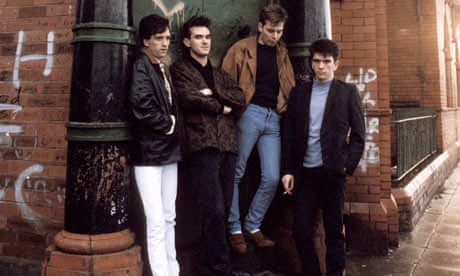Eighteen seconds in, a high-pitched drone begins. For the next six or so minutes, it does not stop. Segueing between the sampled intro – a snatch of Cicely Courtneidge singing Take Me Back to Dear Old Blighty – and the entry of the group themselves, this subtly modulating guitar feedback is both a formal device, to bridge the song's various changes, and a statement of intent: this is serious, this is getting to the heart of the matter – so listen up!
Like the Sex Pistols' God Save the Queen, the Smiths' The Queen Is Dead was designed as a state-of-the-nation address. The parallels are many: explicit criticism of the monarchy as a pillar of the existing class system; the toughest hard rock as the most effective method of making your point; lyrics that are a blast of eloquent rage from the standpoint of an outsider – in each case a young man of Irish extraction. Both reached No 2 in the charts.
The Queen Is Dead is the Smiths' mature masterpiece. The playing is faultless: the rhythm section is both supple and relentless, while Johnny Marr's wah-wah guitar is constantly in motion, in total sympathy with the song's mood changes: rhythmic and viciously propulsive one minute, ambient the next. Morrissey's lyrics are pointed, witty and tricksy, with their implied rhymes: "castration" instead of "strings" to take just one example.
Best of all, they give a thorough portrait of how it feels to be an outsider, rooted in a precise physical and psychological place – "hemmed in like a boar between arches". When you hear the line "but the rain that flattens my hair" you can think of no other place than Manchester, and in many ways The Queen Is Dead represents the highpoint of Morrissey's lyric writing – when he was still informed by his city and its past.
This sense of rootedness is important. You intuitively sense that the musicians have experienced, indeed have deeply felt, what they are communicating. They know of what they speak. This sense transmits itself to the listener, who in turn finds a reflection of their own experience, and so the bond is forged. And that sense of connection remains: two and a half decades after I first heard it, The Queen Is Dead still rings proud and strong.
When The Queen Is Dead was released in June 1986, Britain was nearing the end of a second term of Margaret Thatcher's Conservative government. The miners were vanquished, the "new right" triumphant. Acid house was still underground, while the Live Aid effect had smeared middle-brow values all over rock music. There was surprisingly little dissidence expressed in popular culture, as the onset of CD software inaugurated a wave of retro marketing.
It was no accident that the Smiths engaged the period's other great outsider, Derek Jarman, to shoot a video to accompany the song. In many ways, this accompanying film – with its deserted docklands, androgynous figures, fast super 8 cutting and overlays – prefigures many of the themes and the techniques of his 1987 masterpiece, The Last of England – a howl of rage at third-term Thatcherism.
I've been thinking about The Queen Is Dead a lot after the student riots last Thursday (9 December). When something fundamental happens, it often falls to music to make some kind of emotional sense of an event that has strongly affected you. (When the HMS Sheffield was sunk in May 1982, I played the Sex Pistols' Holidays in the Sun over and over and over again, until my anger dissolved into tears).
The day's events are rich in resonance, quite apart from the actual power and the strength of feeling of the protest itself (and the police over-reaction). The increase in fees will mean that thousands of adolescents will now not go to university, which means that they will have to go to work: well, what work? The most recent unemployment figures show that the 18-24 age group is proportionately the worst hit by the recession.
It seems as though the coalition government has thrown the nation's youth into the dustbin (contrast with the National Assembly for Wales, which has capped fees at £3,290). In fact, youth has a huge symbolic and actual value: not only does it embody the future, it also symbolises the wish of a society to look forward, to prosper and grow.
You look at the picture of the young protestor, rising above the serried ranks of the police, resplendent in her This Is England haircut and Hatful of Hollow T-shirt. Then you read how Marr and Morrissey are undignified and "pompous" because they have tweeted their displeasure at David Cameron saying he likes the Smiths. They wrote the songs, they have every right. Such criticism merely reveals the conservatism of those who make it.
Then there's the picture of Charles and Camilla reeling in fright as a few citizens give them a bit of stick. ("The Queen is dead, boys, and it's so lonely on a limb"). This occurs in Regent Street, the London thoroughfare laid out by John Nash in the early 19th century, partly to prevent a repeat of the 1780 Gordon Riots – that major outbreak of urban disorder referenced by Malcolm McLaren in the Sex Pistols' film, The Great Rock'n Roll Swindle.
So you begin to get some hint of how this all binds together. Contrary to the babblings of the commentariat, pop music can have enormous emotional and social power. It can reflect and engage deep psychic and national archetypes. To deny that is to wilfully ignore a wealth of possibility and, indeed, a form of communication shared by thousands, if not millions – a form of communication that enables the voice of youth to be heard. Listen up!

Comments (…)
Sign in or create your Guardian account to join the discussion